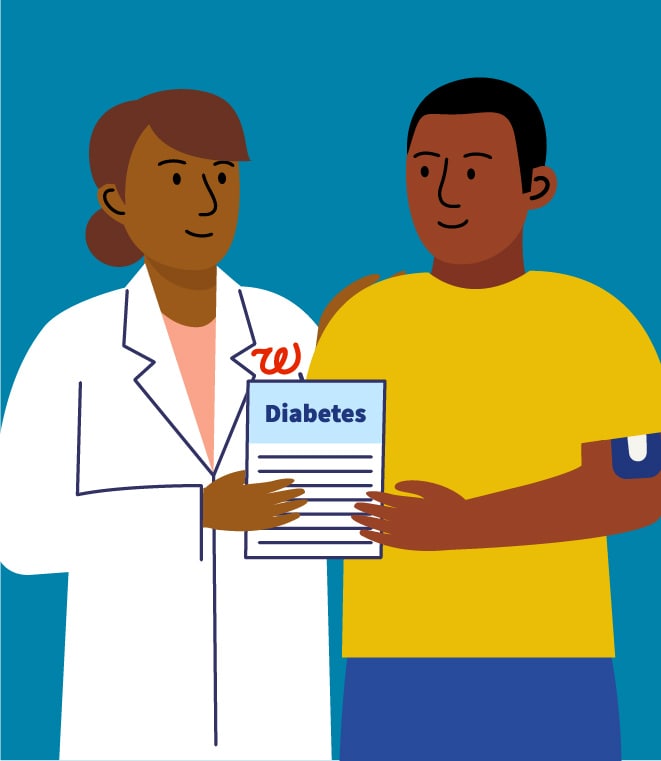Health
How to take care of your mental health and well-being after a diabetes diagnosis
By Loren M. Blinde, PhD Aug 10, 2022 • 7 min
The moment you’re diagnosed with diabetes, your life changes. Choices you once took for granted, like what to eat and drink, now take on new urgency and importance. You may have to overhaul your habits and routines, including sleep, exercise and meals. You may begin to look at dozens of decisions you make each day through a new lens. Dealing with all these life changes at once can be overwhelming and can have a significant effect on your mental health and well-being—and that, in turn, can affect your physical health.
Diabetes and depression
People living with diabetes are two to three times more likely to have depression than people who do not have diabetes. Yet most do not get treatment. Only 25% to 50% of people battling diabetes and depression are diagnosed and treated. If you’re dealing with feelings of sadness, hopelessness or other depression symptoms that don’t go away and are interfering with your life, there are treatments that can help.
Diabetes and anxiety
As a person with diabetes, you have a lot on your shoulders. It’s not surprising that people with diabetes are 20% more likely to have anxiety compared to people without diabetes. The key to living well with diabetes is good self-management.
Over time, you’ll get used to how your body responds to certain foods or activities. But at first, it can be hard to predict how your daily choices will impact your blood sugar levels. The stress and uncertainty involved in managing a chronic disease like diabetes can contribute to high anxiety levels for individuals living with it. It is important to remember that symptoms of anxiety may feel like symptoms of low blood sugar. If you are feeling anxious, check your blood sugar and treat it if necessary.
Treatment options for depression and anxiety
Depression and anxiety disorders are generally treated with:
- Talk therapy, which may include cognitive behavioral therapy, acceptance and commitment therapy or another type of therapy tailored to your needs
- Medication, which may include antidepressants, anti-anxiety medicines, beta blockers or other medications depending on your specific situation
To help reduce symptoms of depression or anxiety, try these tips:
- Join a support group for people living with diabetes to learn, share experiences, get encouragement and feel part of a community
- Use stress management techniques, including incorporating exercise into your daily routine, getting adequate sleep, making time for relaxation, and practicing meditation and mindfulness
- Avoid smoking and excessive alcohol use
Diabetes distress
Diabetes distress is a term for feeling burned out, overwhelmed, discouraged or tired of dealing with your diabetes, and it’s very common. Up to half of people with diabetes have symptoms of diabetes distress in a given 18-month period.
Here are some ways to prevent diabetes distress from derailing your diabetes self-management efforts:
- Check in with your emotions. Identifying what you’re feeling, whether sad, scared, angry or frustrated, is the first step to working through those emotions in a healthy way.
- Focus on small diabetes management goals. Work with your healthcare provider to make a plan that includes small goals that feel simple to achieve.
- Add an endocrinologist to your team. An endocrinologist is a doctor who specializes in endocrine system disorders, including diabetes. As a diabetes expert, an endocrinologist may have a fuller understanding of the challenges you’re dealing with.
- Watch out for denial. It’s tempting to deny the reality of your diabetes, or to make it seem less important, or less serious, than it is. Doing that won’t help, though, and it may increase your chance of developing dangerous complications from your diabetes.
- Meet with a diabetes educator. Diabetes educators are experts in helping you learn how to manage your diabetes and keep your blood sugar levels in your target range. They’re a great source of information and helpful tips, which can help you feel confident that you can live well with diabetes.
- Reduce financial impact. Managing diabetes well requires medications and testing supplies, and concerns about costs can be a source of stress. There are programs available that can help with diabetes costs. Talk with your healthcare provider or Walgreens pharmacist to learn more.
- Talk with a mental health provider. Your primary care provider can help you connect with a mental health provider who can help.
The mind and the body are connected. That means that your physical health and your mental health can affect each other. Taking care of your mental health and well-being is an important part of a successful overall diabetes management strategy.
For more resources and tips to help you live well with diabetes, check out The ThreadTM, talk with your healthcare provider or ask your local Walgreens pharmacist.
This article is meant for informational purposes only. Always seek the advice of your physician or qualified healthcare professional.
Published August 2022.
Sources:
- https://www.cdc.gov/diabetes/managing/mental-health.html
- https://www.nimh.nih.gov/health/topics/anxiety-disorders
- https://www.nimh.nih.gov/health/topics/depression
- https://www.cdc.gov/diabetes/managing/diabetes-distress/ten-tips-coping-diabetes-distress.html
- https://www.cdc.gov/tobacco/campaign/tips/diseases/depression-anxiety.html
- https://www.diabetes.org/healthy-living/mental-health


